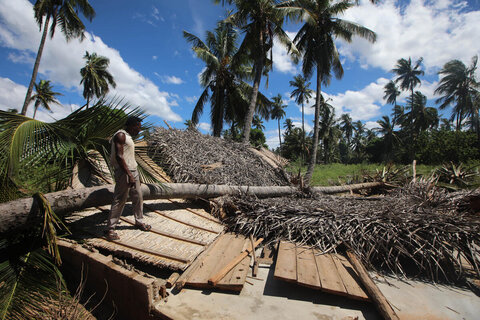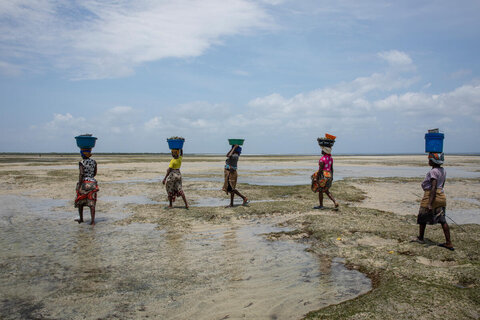Mozambique: WFP assists families fleeing conflict in Cabo Delgado

In Cabo Delgado, in the north of Mozambique, a humanitarian crisis is unfolding that is receiving little global attention.
More than 2,000 people have reportedly been killed since October 2017 and the number of people driven from their homes has increased fourfold since February.
Conflict kicked off in 2017 when non-state armed groups attacked police stations in the town of Mocimboa da Praia. Throughout last year, as the country reeled from the devasting impact of two cyclones, it continued — this year the violence has only escalated.
Around 390,000 people have been displaced in Cabo Delgado, one of the poorest parts of the country of 30 million.

Aldeias, Portuguese for villages, are often attacked during the early morning hours. Those fleeing must often abandon their homes without any warning; on foot, with no food, water, money, documents or clothes.
Some flee into the bush, surviving by drinking river water and eating at farms they find along the way, only to return and find their homes burnt to the ground, forcing them to move southwards towards the provincial capital of Pemba and beyond. Others, fearing attacks on coastal villages, pack onto boats to sail southwards, going for days without food or water.

After a pre-dawn attack on her coastal aldeia in July, a mother, who identifies herself as Fatima, tragically witnessed three of her sons being killed on the beach before making her way south with her surviving son and daughter.
On a boat filled to the brim with people, they sailed for three days, hungry and thirsty until they arrived in Metuge district, where they were taken in by Fatima's sister. There is now no hope of returning home. "They kidnap the women to violate them and force them into marriage," says Fatima. "The older men they kill. The young men are forced to join them [the militants]."

This harrowing story is sadly all too familiar in Cabo Delgado — yet there is a glimmer of hope in the generosity of relatives and host families. People open their homes to those fleeing the violence. But hospitality wears thin when hosts themselves are facing daily pressures — they can only share what little they have with the new arrivals for so long before interpersonal tensions arise.
Fatima is forced to sleep outside as there is not enough space in her sister's home for her and her children — they are dependent on food assistance from the World Food Programme.
Fishing was the primary source of income in their village, so the family is facing difficulties adjusting to the new reality in Metuge, where they now help Fatima's sister on her farm. Having suffered a poor harvest, the family also relies on WFP to meet critical nutritional needs.

Helena is another mother who fled from an early morning attack in Muidumbi district. Things were already difficult with COVID-19, she says, with school closures interrupting children's education, a matter that remains at the fore of her concerns, having left behind critical belongings such as clothes.
"My daughter has wanted to be a doctor ever since she learned how to read," she says. With the support of donors, to date WFP has provided food to over 230,000 people displaced by the violence — without swift action from the international community, however, continued conflict and displacement could spell disaster for people here next year. There simply are not the funds for the organization to respond to both the conflict and COVD-19 — especially given extreme weather is likely around the corner.

"WFP's been gradually scaling up its assistance to respond to growing needs this year," says Antonella D'Aprile, Mozambique Country Representative for the humanitarian agency which has been named Nobel Peace Laureate 2020. "However, we still need additional resources to be able to assist the affected populations in a timely manner." She adds: "Over the next few months, especially as the rainy and cyclone season approaches, we should work collectively to make sure that life-saving assistance is being delivered despite the significant challenges we will be facing".
WFP operations in Cabo Delgado are made possible with the generous support of the governments of Canada, Japan and Norway, along with ECHO, UN CERF and USAID.


